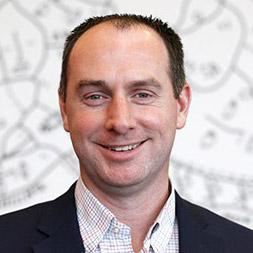Eliane Boucher, Research Scientist at Happify Health

As a Research Scientist, I work closely with the science team to design and implement research projects, which include observational research, randomized controlled trials, and qualitative research. Industry research can be very different—it moves at a faster pace and you have to consider your stakeholders and not just your independent research agenda. Much of what I do involves meeting with the leads from our various departments to learn what claims they’d like to make and then develop studies to support their needs. I also communicate our research findings to internal stakeholders and to clients, submit publications, and I’ve even had the opportunity to collaborate with our marketing team to develop infographics based on our research.
Digital therapeutics is a fast-paced and exciting environment, and startup culture involves wearing a lot of hats and learning a lot of new skills, so it’s not for everyone. Personally, after 10 years in academia, where days started to all feel the same, I really enjoy that my days are unpredictable and I frequently have the opportunity to solve new problems.
Ryne Sherman, Chief Science Officer at Hogan Assessments

While there were multiple factors that played into my decision to leave academia, the most important was the opportunity to make a bigger impact. As Hogan’s Chief Science Officer, I help leaders ranging from small nonprofits to major international companies make critical personnel decisions. When organizations make better decisions about personnel, those organizations thrive. When those organizations thrive, their employees, investors, and customers thrive. When companies, employees, investors, and customers thrive, the global economy thrives. And when the global economy thrives, the quality of life for many people improves. In this regard, I truly see my work as having an indirect impact on millions of people.
Perhaps the most notable difference from an academic job is that I spend far less time doing the things I never enjoyed (grading, faculty meetings) and far more time focused on solving real problems in real-time. For example, a client recently came to us asking for help hiring managers who will prioritize staff diversity and inclusion. Using my knowledge and skills as a personality/social psychologist to help them solve that problem was an enjoyable and rewarding experience.
Kate Rogers, Senior Behavioral Scientist at Zillow

I joined the Behavioral Science team at Zillow in 2019 after about 4 years in my tenure track position. Ultimately, my decision to leave academia came down to how I wanted my life outside of my job to look. I had always worked my life around my job, but I took a step back and quite literally wrote down a list of what I wanted out of my life and then listed how different careers could best help me achieve that. While there were many great aspects of my tenure-track position, for me the industry position fit better.
The primary work I do at Zillow is similar to what I did as a professor—I do research (often experiments) from idea generation stage to dissemination. Two of the biggest differences for me are that the project lifecycle is much quicker (typically weeks) and the goal is always to inform a business decision. Additionally, communicating research to business stakeholders is a bit different than an academic audience.
I get to work with people who have diverse training and I have learned an incredible amount from them. Broadly, my work and work environment are intellectually stimulating, fast-paced, supportive, and often pretty fun. I really enjoy working in an environment where people are excited about the research and seeing it implemented is incredibly rewarding.
SPSP is committed to advancing the promotion of careers in personality and social psychology—both inside and outside academia. The SPSP Applied Psychology Committee works to achieve this goal and in addition to developing a resource page, they have created opportunities to showcase applied work at the annual convention. More than 500 convention attendees participated in a professional development session at the recent convention.




